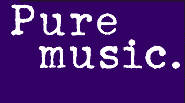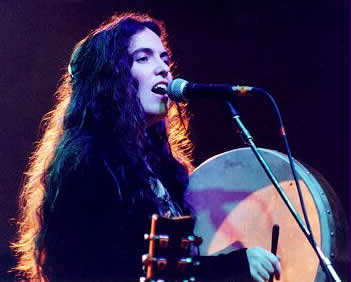 |
 |
|||||||||
Susan McKeown: Sheila-Na-Gig. [her music company]
Puremusic: Susan, it's Frank Goodman.
SM: Hi, Frank!...
PM: How are you?
SM: I'm grand. How are you?
PM: Lovely, thanks.
SM: We were just listening to your record.
PM: Were you?
SM: Just now. It's perfect for this weather, it's finally getting good. Who's that playing bass?
PM: Mostly Michael Rhodes.
SM: Ah, I see. Very nice.
PM: I'm just back from the Kerrville Folk Festival, that was great fun. I had a bunch of albums to review, and before I called you, I spun back to your recent Lowlands for 30 or 40 minutes. I don't mind saying, in fact I love saying, that I'm completely and utterly floored by this recording.
SM: Wow, really? That's great.
PM: The more I listen to it, the harder it is to believe what you have here. [She's laughing.] Are people understanding what a tremendous document this is? [Susan inadvertently pushes a button and hangs up, I redial.]
SM: I'm sorry, I'm getting used to this phone, we just got it. It's got buttons on both sides, so I'll try and keep my hands out of the way.
PM: Are people understanding what an incredible document this record is?
SM: Wow, what a question. [laughs]
PM: I mean, I know You must know, I can see what you put into it.
SM: Well, I'm happy with it. And it's hard.. .You know yourself, when you've made a few records, you still want to make it the best thing that it can be, and I was really content with all the material and how it hung together. That all of the arrangements flowed, even if they were different, they all fitted together well into a piece. But the songs were the main thing, that's always the main focus for me.
PM: You can tell from the liner notes how much these songs mean to the singer.
SM: That's lovely.
PM: And how well she's picked them.
SM: On my first traditional record (this is my second one of traditional songs), there were songs that I might have known for a long time, so it was easy to pick those out. On this one, I learned a lot of new ones specifically, I really went searching. But I do that a lot, I'm always on the lookout for old songs. Sung by old men and women in their kitchens, that were collected from the 30s, 40s and 50s in Ireland. So I went out looking for rare songs, rather than the Irish songs you can all sing and drink along to. I like some of those, too, but for these kinds of records, I like to unearth those that I think are beautiful and that haven't been sung, or that I've never heard of.
PM: There's plenty of records of songs that everybody can drink to.
SM: So, it's a little bit of a mission, but it's a really enjoyable one, and rewarding. I feel very lucky to be able to get paid to do it.
PM: They should pay you gobs of money.
SM: They should, I know. [laughs]
PM: And I still believe they will. When we first crossed paths in Heidelberg in the mid 90s..
SM: That was great, I'll never forget it.
PM: It was a wonderful show. I remember seeing you on stage, thinking "Who is this barefoot high priestess of what she's doing here?" [the phone hangs up again, I redial.]
SM: My God. If this happens again, I've written down your number, I'll call you back.
PM: It's no problem, I just press redial. Besides, most every interview has some quirky thing that goes on, and I think it's funny.
SM: Well, okay. [laughs]
PM: The pictures in the artwork for Lowlands all have a Celtic voodoo quality that I've come to associate with you now. We're very interested in any outtakes you have from that shoot.
SM: Grand. I'll have a look for you.
PM: So, back in the days when we first ran across each other, I picked up a copy of Bones, [PrimeCD] and I'm still knocked out by the originality of that disc.
SM: That's great.
PM: How do you feel about Bones today?
SM: I still love it, it's still very close to my heart. I'm working on what I call Bones II at the moment.
PM: Really?
SM: I don't know what it's going to be called. But I'm trying to pick up the strands of where that one left off, and make a Bones for the new millenium.
PM: Do I understand correctly that after that first record of original material, you embarked rather directly in the direction of more traditional records?
SM: It was after that first record, because I haven't made another record like Bones. I've had original work on other records that I've done, but nothing like that, you know. I've done two albums of all traditional songs, Bushes and Briars, and Lowlands. Then I've done two collaborative records, one with [bassist] Lindsey Horner, whom you met in Germany.
PM: A brilliant musician.
SM: Yes. He's living in Pittsburgh now.
PM: Is he, why?
SM: He spent some time in Europe, and he met a girl.
PM: That happens.
SM: Yes, and she's in Pittsburgh. [This sparked a little private conversation about a mutual friend.]
PM: So, I'll ask a general, but a personal, question. What kind of person are you, would you say, what matters to you?
SM: [long pauses between each response] Wow. People. Life and death. Working your shit out in this one. And music. And trying to make it the best journey for everyone.
PM: [clearing my throat] Pardon me if I get a little choked up here. I'm kinda prone that way. [We both laugh.]
SM: By all means.
PM: I have a special fondness for singers that sing like people and not like singers. In your voice, I hear an archetypal depth and strength of feminine spirit. Any thoughts on being a woman in this business, or in this world? continue